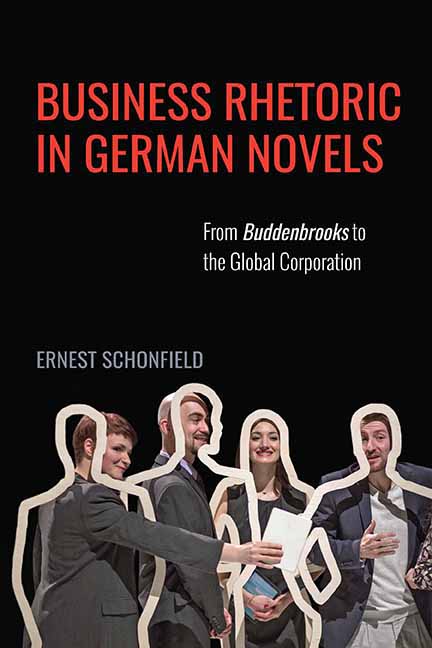Book contents
- Frontmatter
- Dedication
- Contents
- Acknowledgments
- List of Abbreviations
- Introduction
- 1 Managing Appearances in Thomas Mann's Buddenbrooks, 1901
- 2 Oratory and Publicity in Heinrich Mann's Der Untertan, 1914/18
- 3 Organizing Speech in Gabriele Tergit's Käsebier erobert den Kurfürstendamm, 1931
- 4 Seeing through the Rhetoric in Bertolt Brecht's Dreigroschenroman, 1934
- 5 Giving an Account of the Self in Ingeborg Bachmann's Malina, 1971
- 6 Negotiating Bureaucracy in Hermann Kant's Das Impressum, 1972
- 7 Corporate Discourse in Friedrich Christian Delius's Unsere Siemens-Welt, 1972
- 8 Producing Ethos in Kathrin Röggla's wir schlafen nicht, 2004
- 9 Communicative Contests in Philipp Schönthaler's Das Schiff das singend zieht auf seiner Bahn, 2013
- Conclusion
- Notes
- Bibliography
- Index
2 - Oratory and Publicity in Heinrich Mann's Der Untertan, 1914/18
Published online by Cambridge University Press: 15 August 2018
- Frontmatter
- Dedication
- Contents
- Acknowledgments
- List of Abbreviations
- Introduction
- 1 Managing Appearances in Thomas Mann's Buddenbrooks, 1901
- 2 Oratory and Publicity in Heinrich Mann's Der Untertan, 1914/18
- 3 Organizing Speech in Gabriele Tergit's Käsebier erobert den Kurfürstendamm, 1931
- 4 Seeing through the Rhetoric in Bertolt Brecht's Dreigroschenroman, 1934
- 5 Giving an Account of the Self in Ingeborg Bachmann's Malina, 1971
- 6 Negotiating Bureaucracy in Hermann Kant's Das Impressum, 1972
- 7 Corporate Discourse in Friedrich Christian Delius's Unsere Siemens-Welt, 1972
- 8 Producing Ethos in Kathrin Röggla's wir schlafen nicht, 2004
- 9 Communicative Contests in Philipp Schönthaler's Das Schiff das singend zieht auf seiner Bahn, 2013
- Conclusion
- Notes
- Bibliography
- Index
Summary
ein Redner ist er zwar nicht, aber ein Schreier und auch das genügt manchen. [He is not an orator but a shouter—that is enough for some people.]
—Franz KafkaIntroduction: The Media Kaiser; Business Networks
DER UNTERTAN (The Loyal Subject / The Man of Straw), by Heinrich Mann (1871–1950), depicts the rise of Diederich Heßling, a paper manufacturer who builds an economic empire in the small town of Netzig. He is a charismatic businessman who continually invokes a sense of crisis in order to achieve his ends, acting as if he is “pflichtmäßiger Vollstrecker einer harten Notwendigkeit” (“the conscientious instrument of dire necessity”). Set in the 1890s, it is a study of the German bourgeoisie in the age of global imperialism. The broad plotline bears comparison to Thomas Mann's Buddenbrooks: readers are presented with two rival business families, the Heßlings and the Bucks. The Buck family declines, and Diederich takes over. At the end of the novel Diederich even buys his rivals’ family home (U 453; LS 330), just as Hagenström does in Buddenbrooks. The characters in both novels share an obsession with form. As Diederich's mentor Wiebel tells him, “Formen sind kein leerer Wahn” (U 35; “good form is not a vain illusion,” LS 21). And yet Heinrich Mann comes to very different conclusions about the German middle classes than his younger brother. Der Untertan is overshadowed by the most prominent media personality of the age, Kaiser Wilhelm II. The kaiser's prominence caused him to function as the mirror in which the entire period saw itself. Walther Rathenau described the kaiser's many prominent media interventions as “elektro-journalistischer Cäsaropapismus” (electro-journalistic Caesaropapism). The reign of Wilhelm II, the “media emperor,” represents an important transitional stage between the ruling elites of the nineteenth century and their more media-conscious imitators in the twentieth century. The new configuration between politics and media influenced German literary modernism, too. Cultural production in Imperial Germany occurred under the sign of Paragraph 95 of the Reichsstrafgesetzbuch (Imperial Criminal Law Code), detailing the crime of Majestätsbeleidigung (lèse-majesté), with a penal sentence of between two months and five years.
- Type
- Chapter
- Information
- Business Rhetoric in German NovelsFrom Buddenbrooks to the Global Corporation, pp. 40 - 56Publisher: Boydell & BrewerPrint publication year: 2018

